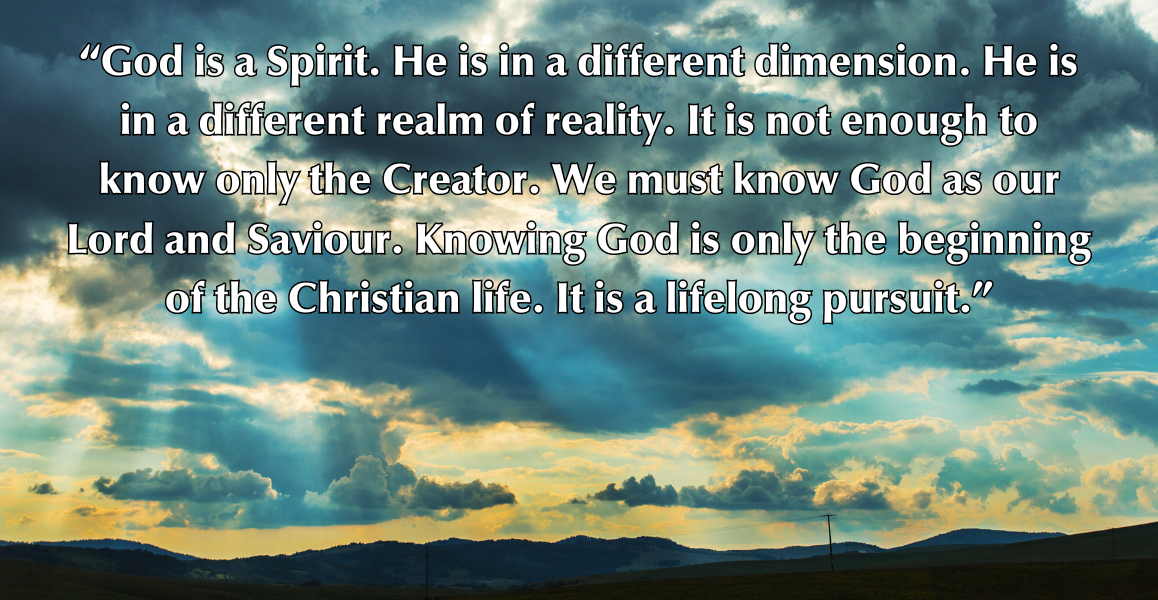There is no empirical evidence showing that God exists. Science alone cannot prove or disprove the existence of God. But, there are at least four places where God has revealed himself to us to tell us who he is.
First, look to creation. Life does not appear out of nothing from non-life. The universe exists. Who created the universe? The universe had a beginning. God is revealed in nature. Nature is not God, but God is the Creator of nature and reveals himself through nature.
Psalm 19: 1 tells us: “The heavens declare the glory of God; the skies proclaim the work of his hands.” Nature shows the greatness of God. The more we learn about the universe, the more we can see the work of God.
Romans 1: 20 also tells us that a basic understanding of God can be gained from the natural world. We call this general revelation. This points us to God as Creator. Have you considered the following: twenty-nine percent of earth’s surface is covered by land while seventy-one percent by water? If the percentages were reversed, we would burn up and die. The planet earth rotates at about 1,038 miles per hour. If we rotated at 100 miles per hour, our days and nights would be ten times longer. It would be impossible for humans to live like that.
Second, look into our own conscience. Humans have “moral awareness” or “moral consciousness.” The conscience reacts when one’s actions, thoughts, and words conform to, or are contrary to, a standard of right and wrong. Romans 2: 15 tells us: “since they show that the requirements of the law are written on their hearts, their consciences also bearing witness, and their thoughts now accusing, now even defending them.” In other words, our own hearts tell us there is a God whose law is written on our conscience, and we have broken that law and we know it.
Third, look to the Bible. God exists because the Bible tells us that God created the heavens and the earth (Genesis 1: 1). We can know God through the revelation he has given us in the Bible. God has told us many things about himself, about humans, and about the universe that he has made.
Jesus tells his disciples in the upper room that the Holy Spirit would guide them into all truth (John 16: 13a). Because of the Spirit’s work through the disciples, we have his record: the New Testament. We should study the New Testament to know Jesus better. Jesus reveals who God is (Hebrews 1: 3a).
Jesus and his followers pointed us to the Jewish Scriptures as a reliable revelation of who God is. Modern followers of Jesus believe that Jesus fulfills the Old Testament (Matthew 5:17). The Bible (Old and New Testament) is about Jesus and he is its fulfillment in all ways.
Fourth, look to Jesus. In John 8: 19b Jesus said: “If you knew me, you would know my Father also.” You would know who God is. Why? Because Jesus said in John 10: 30, “I and the Father are one.” It was a bold statement. The Father and Jesus are united in will and purpose.
Was Jesus telling the truth? We can know that Jesus was telling the truth by getting to know him. We can read the four accounts of his life and teachings called the Gospels of Matthew, Mark, Luke, and John. Jesus was with God in the beginning (John 1: 1). In Jesus we see what God is like.
How can we know God? Creation, conscience, the Bible, and Jesus all point us to God. God is a Spirit. He is in a different dimension. He is in a different realm of reality. It is not enough to know only the Creator. We must know God as our Lord and Saviour. Knowing God is only the beginning of the Christian life. It is a lifelong pursuit.
God is God; we are not God. We will never become God. Because God is infinite and we are finite, we can never arrive at a complete understanding of God. We will never know all things about God. The Christian life is a journey. It is one in which we continually seek to know God in deeper ways. We walk through life with God. We talk to God. We worship God. We listen to God speaking through the Bible. We should be growing in our knowledge of God through our entire lives. God lives among us and within us. Let us thank God for our special relationship with him!
For those who would like to know more about God, please read Professor Millard J. Erickson’s book called God the Father Almighty, Baker Books, 1998.




